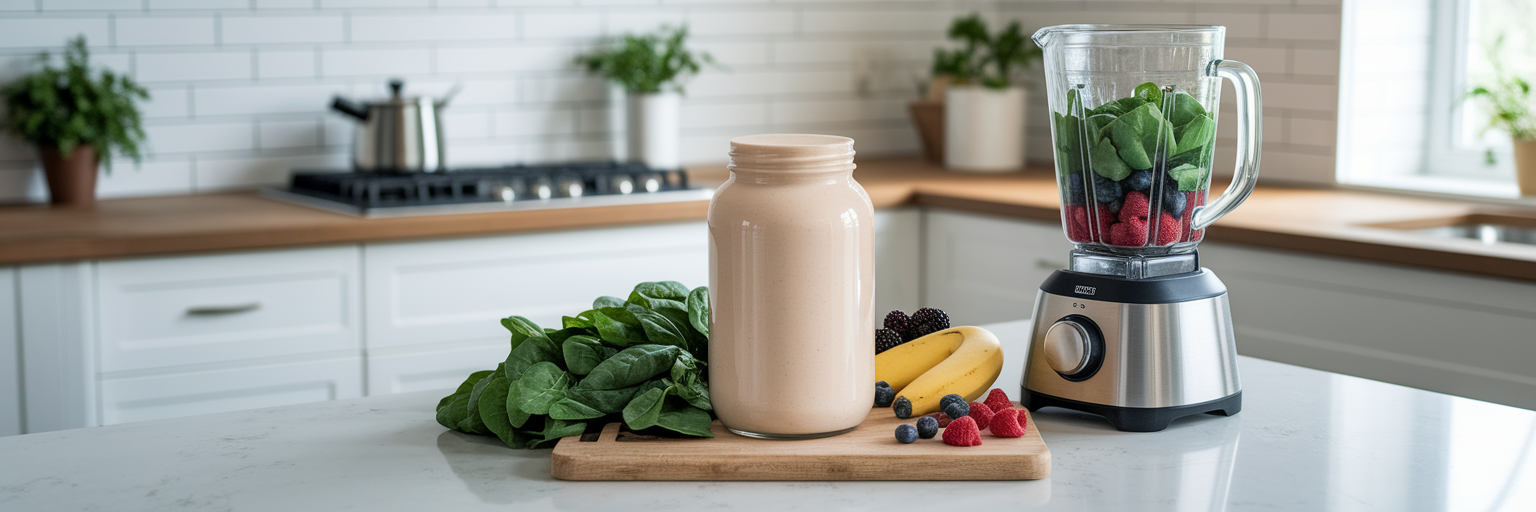Menopause is a natural transition, a new chapter that millions of women experience. In the United States, this change typically begins around age 51, marking a shift in your body’s internal rhythm. It’s not something to dread, but rather an invitation to listen more closely to what your body needs. The central change is a decline in estrogen, a hormone that acts as the body's master regulator for everything from mood to metabolism. When its levels drop, you might notice things feel different.
Suddenly, maintaining muscle seems harder, your metabolism feels like it’s hit the brakes, and your energy levels can be frustratingly unpredictable. These aren't just random symptoms; they are direct results of this hormonal shift. We’ve all felt that moment of frustration when familiar wellness routines no longer deliver the same results. The good news is that you have powerful tools to work with your body, not against it. Nutrition, specifically your protein intake, becomes a foundational piece of the puzzle, directly addressing these new challenges and helping you feel strong and vibrant.
Why Protein Becomes Your Best Friend in Menopause
With the hormonal shifts we just discussed, protein steps up as a crucial ally. It’s not just about building muscle in the gym; it’s about providing your body with the fundamental resources it needs to navigate this transition gracefully. Think of it as the essential toolkit for maintaining your body’s strength and vitality.
Here’s how adequate protein intake offers tangible solutions:
- Preserving Lean Muscle: The decline in estrogen can accelerate age-related muscle loss, a condition known as sarcopenia. Protein provides the essential amino acids, the literal building blocks your body needs to repair and maintain muscle tissue. This is vital for everyday strength, good posture, and staying active.
- Supporting a Healthy Metabolism: Have you ever wondered why your metabolism seems to have slowed down? It's often linked to muscle loss. Lean muscle is metabolically active, meaning it burns more calories at rest than fat does. By preserving that muscle with sufficient protein, you can more effectively support your metabolic rate.
- Stabilizing Energy and Mood: Protein plays a key role in blood sugar regulation. When you include it in your meals, it slows the absorption of carbohydrates, helping to prevent the sharp energy spikes and subsequent crashes that can leave you feeling fatigued, foggy, and irritable. This is a simple way to address how to balance hormones during menopause by managing their downstream effects. For delicious ways to do this, check out some of our favorite easy vegan protein recipes.
- Strengthening Your Bones: While calcium often gets all the attention for bone health, protein is just as important. It forms the structural matrix of your bones, giving them strength and resilience. As osteoporosis risk increases after menopause, ensuring you get enough protein is a critical step in protecting your skeletal framework.
The Plant-Powered Edge for Hormonal Health

While all protein is important, a vegan protein for menopause offers some unique advantages that are particularly suited to this life stage. It’s not just about what’s in the protein, but also what comes with it. Plant-based sources can provide a more holistic approach to wellness, addressing more than just muscle maintenance.
Gentler on Your Digestion
Many women experience increased digestive sensitivity and bloating during menopause. Plant proteins, such as those from peas and brown rice, are often easier on the gut. They are naturally free of lactose, a common trigger for digestive discomfort found in dairy-based proteins like whey.
The Phytoestrogen Factor
Certain plants, especially soy, contain compounds called phytoestrogens. These plant-based compounds can weakly interact with the body's estrogen receptors, potentially helping to moderate some symptoms. In fact, research highlighted by The Menopause Society suggests that a low-fat plant based diet for hot flashes, supplemented with soy, can significantly reduce their frequency and severity.
More Than Just Protein: Fiber and Antioxidants
Unlike isolated animal proteins, plant-based protein powders often come with bonus nutrients. They retain some of the plant’s natural fiber, which is essential for a healthy gut microbiome and regular digestion. They are also rich in antioxidants, which help combat oxidative stress and inflammation in the body.
A Heart-Smart Choice for Long-Term Health
Cardiovascular health becomes a greater priority after menopause, as the risk of heart disease increases. Diets rich in plant-based foods are consistently linked to better heart health outcomes, including lower cholesterol levels. Choosing a plant-based protein fits perfectly into a heart-smart lifestyle.
| Feature | Plant-Based Protein (Pea, Rice, Soy) | Animal-Based Protein (Whey, Casein) |
|---|---|---|
| Digestive Comfort | Often gentler, less likely to cause bloating | Can cause digestive upset (lactose) for some |
| Hormonal Support | Contains phytoestrogens (especially soy) that may help balance hormones | No phytoestrogen content |
| Bonus Nutrients | Rich in fiber, antioxidants, and micronutrients | Primarily isolated protein; lacks fiber |
| Heart Health | Associated with lower cholesterol and better cardiovascular outcomes | Some sources are higher in saturated fat |
How to Choose Your Perfect Plant-Based Protein
Walking down the supplement aisle can feel overwhelming. With so many options, how do you find the best protein powder for women over 50? The key is to know what to look for. Here are a few simple guidelines to help you make a confident choice.
- Look for a Complete Amino Acid Profile: Your body needs all nine essential amino acids to effectively build and repair tissue. While some plant proteins are incomplete on their own, blends that combine sources like pea and brown rice create a full amino acid profile, making them just as effective as animal-based proteins.
- Read the Ingredient List: The shorter, the better. Look for minimal, recognizable ingredients. Avoid products loaded with artificial sweeteners, fillers, gums, and hidden sugars. A clean label is a sign of a high-quality product, like our chocolate vegan protein, which is crafted to be pure and effective.
- Choose Based on Your Goals: If managing menopause symptoms naturally like hot flashes is a top priority, a soy-based protein might be a great fit. If you have a particularly sensitive stomach, a simple pea or brown rice protein could be the ideal choice. Align your protein with your primary wellness goal.
- Consider Taste and Texture: Let’s be honest, if you don’t enjoy it, you won’t use it. Read reviews to get a sense of how a powder mixes and tastes. If possible, try a single-serving packet before committing to a large tub. Finding one you genuinely like makes it a treat, not a chore.
Simple Ways to Boost Your Daily Protein Intake

Knowing you need more protein is one thing; actually getting it is another. The goal is to make it a seamless part of your day. Experts often recommend 1.0 to 1.2 grams of protein per kilogram of body weight for women in this life stage. For a 150-pound woman, that’s about 68–82 grams per day. Spreading this intake throughout the day in 20–30 gram increments helps your body utilize it most effectively for muscle repair.
Here are some easy ideas that go beyond the morning smoothie:
- Power up your breakfast: Mix an unflavored or vanilla protein scoop into your morning oatmeal, overnight oats, or plant-based yogurt for a satisfying and filling start.
- Fortify your baked goods: Add a scoop of protein powder to pancake or waffle batter. You won’t even notice it’s there, but your body will thank you.
- Create a creamy, savory boost: Blend unflavored protein powder into creamy soups like butternut squash or tomato bisque. It adds a rich texture and a powerful protein punch.
For more inspiration, you can explore the recipes and tips on our blog. Have other creative ways to use vegan protein? Share your ideas in the comments below!
Embracing Your Health with Plant-Powered Choices
Menopause isn't an end point; it's a powerful opportunity to tune into your body and nourish it with intention. By making small, consistent changes, you can take control of your well-being. Vegan protein is a simple yet profound tool to help you maintain muscle, stabilize your energy, and feel your best during this transition and beyond.
This chapter is yours to define. By choosing foods that support your strength and vitality, you are actively investing in a future filled with health and confidence. We invite you to explore our full range of plant-powered options to support your journey.



